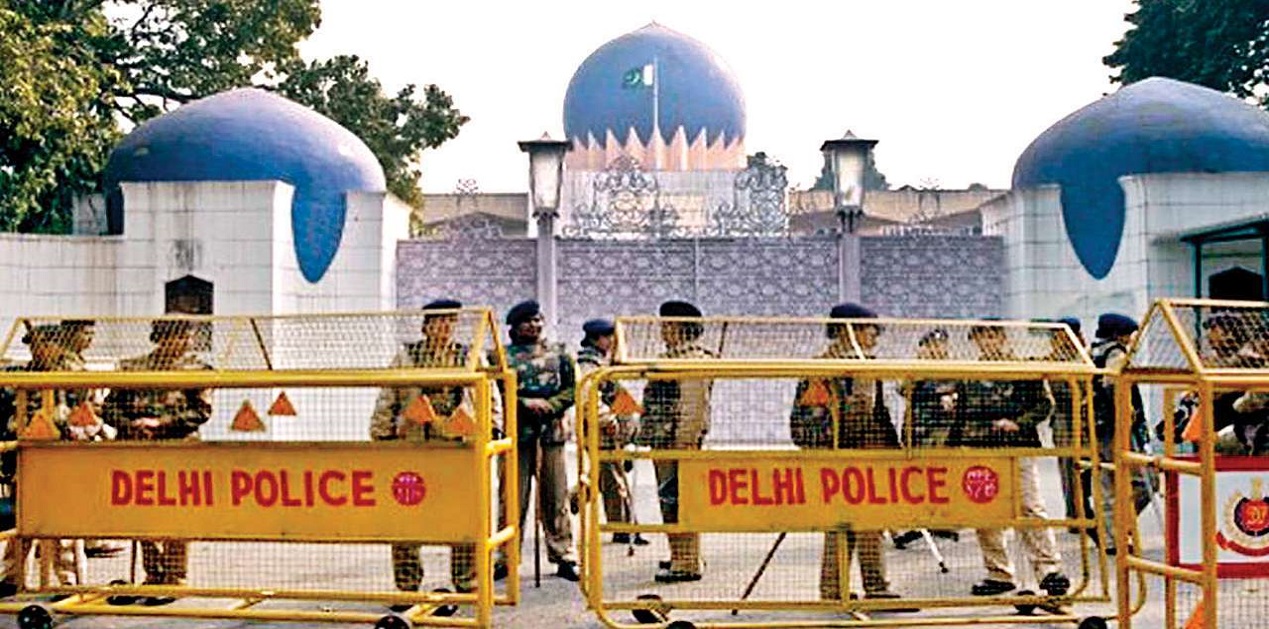The poisoning of a former Russian spy and his daughter in the United Kingdom on March 4, 2018, set off a series of diplomatic expulsions and counter-expulsions between Russia and the western countries, in a limited way, bringing back the memories of the cold-war era. Diplomatic expulsions have always been a subject-matter of great interest, not only for international relations scholars and the intelligence agencies, but also for a wider audience of among the polity.
In this essay, the primary focus is to analyse the significance of diplomatic expulsions in geo-politics, its causes, objectives and implications in the wider context of normal diplomatic relations. Towards the end, the discussions will also focus on the specific features of diplomatic expulsions in the context of India and Pakistan vis-a-vis the western world.
Diplomatic expulsions may be considered as an extreme, but are a standard way of showing outrage. In most cases, intelligence officers enjoying diplomatic immunity are expelled. The officially stated raison d’etre is that their ‘activities are not compatible with their status’- a diplomatic short-hand for spying. However, many times, if the political relations are highly strained, even the regular diplomats are not spared.
Causes and Motivations
Diplomatic expulsions can have a variety of motivations and causes. Deportation may result from a diplomat being suspected of indulging in spying activities. For example, India expelled Pakistani diplomat Mahmood Akhtar in 2016, for indulging in “espionage activities”. Further, these could also result from an act of violence or criminal conspiracy, executed at the behest of the foreign nation in some other state. For example, the recent drama of diplomatic expulsions is the result of such a violent act of poisoning of the former Soviet spy; Sergei Skripal in the British territory, allegedly done by Russia. Besides, they could also result from a sudden burst of political rivalry, military conflict, an act of a terrorist attack, such as the attack on Indian Parliament in 2003 and the 26/11 Mumbai terrorist attack.
The reasons for counter-expulsions are more complicated vis-a-vis expulsions. Their stated causes may be entirely different from the real or hidden motives. For example, when India expelled Mahmood Akhtar, in response, Pakistan expelled Indian diplomat Surjeet Singh, allegedly for violating the Geneva Convention. However, the reciprocal gesture smacked of ulterior motives. It seemed like a cover-up job by the Pakistani authorities to save their image by diverting attention from the disruptive and illegal activities being indulged in by their diplomats.
In the recent case, the British authorities had flimsy evidence to prove a Russian hand in the poisoning of the former Soviet spy. Hence, there is a strong possibility that to strengthen their credibility and legitimacy, the British might have kick started the diplomatic spat. On the other hand, it is also entirely possible that the Russians might have expelled diplomats in response, in a well calibrated attempt to prove their innocence.
Nevertheless, the general trend in the cases of diplomatic expulsions is that these are reciprocal; and the officially stated causes of such acts always have a weak standing on being subjected to rigorous scrutiny by experts.
The Objectives
Diplomatic expulsions are like a tool in the diplomatic arsenal aimed at bringing the desired change in the adversary’s behavior. However, it has been observed that many times they are reactionary and one-off measures without any long term objectives. And, often, the counter expulsions by the target countries are based on the principle of proportionate and justified response. The goals can have a vast range of diversity. For example, India expelled Akhtar to convey that illegal activities detrimental to India’s security and incompatible with his diplomatic position, will not be tolerated and treated with the utmost seriousness. Further, Indian agencies also wanted to liquidate the espionage network created by the ousted diplomat, and send a strong warning signal. Pakistan’s objectives might have had an entirely different orientation in expelling Surjeet Singh but it seems, that they wanted to save their face in the world community, as mentioned above. In the past also, it appears that its allegations of India shrinking diplomatic space for Pakistan and the concomitant diplomatic expulsions were more of a compensatory exercise to come clean out of the sleazy business of funding terrorist operations in India, and blocking the channels of constructive engagement.
But, in many other cases, the diplomatic expulsions are a part of the broader strategic policy framework to deter, pressure and ultimately change the opponent’s behavior. When the United States President Reagan, ordered mass expulsions of Soviet diplomats in 1986, in response to the arrest of Nicholas Daniloff, the American journalist based in Moscow (he was arrested after America arrested Gennady Zakharov, Soviet intelligence officer for spying), it was more like a well-thought action with deliberate strategy and long-term objectives. Reagan and his Secretary of State George Shultz were of the opinion that Americans had to show strength in any engagement with Russians through stringent measures, like diplomatic expulsions, but they were also willing to open a reasonable channels of engagement with Russia wherever possible.
Gorbachev’s experiments with Glasnost and Perestroika, led the US leaders to believe in the possibility of Russian rulers realising the communism’s imminent failure. They thought that Russians might want to seek western world’s cooperation in implementing the economic and political reforms. Hence, on one hand, Reagan was supporting the Mujahideen in Afghanistan and the Polish Solidarity movement against Soviet Russia, on the other hand the US was willing to move forward on nuclear arms control and economic cooperation with Moscow. The expulsion of Soviet diplomats after the Zhakhorov episode did not hinder Reagan-Gorbachov talks on arms control. The deportations were projected as reasonable, proportionate and one-off move. The American approach was clear in harnessing the policy contradictions with Russians. Gorbachev was given a choice of either a difficult or a cooperative America, and he chose the latter.
Effects
Diplomatic expulsions and counter expulsions create challenges for the companies, Non-Governmental Organisations (NGO), and journalists working in the countries involved. They have to face harsh scrutiny, and everyday functioning gets quite challenging in a foreign country due to rigorous official surveillance. Apart from the above, the most significant effects of such events are felt in the intelligence world. Scott Stewart, a counter terrorism expert and Vice-President of STRATFOR, the global intelligence firm, deals at length with this issue in his brief titled, “The Covert Effects of Diplomatic Expulsions.”
Scott Stewart suggests that when intelligence officers under diplomatic cover are declared Persona Non-Grata (PNG) and expelled, activities of Non-Cover intelligence Officers (NCO) or illegals, as Russians would say, increase to fill in the gaps as it were. They are left as main handlers dealing with agents. The spies who were handled by the expelled officers resort to covert communication methods, avoiding in-person contact and the use of susceptible digital networks. Governments tend to deploy more NCOs after such expulsions. As NCOs take up the slack, the counter-intelligence wings increase their monitoring of suspected NCOs, agents and other individuals who are part of the intelligence networks. Thus, it ends up in a kind of intelligence war. It may also result in mass arrests and cold war like spy swaps.
Scott Stewart further opines that western countries have strict privacy rules, democratic systems and greater freedoms and hence it is easier for spies to operate as compared to Russia where activities of spies are already highly constrained due to lack privacy rights and authoritarian systems. Hence, the authoritarian governments are at a disadvantage when their spies are expelled, as their spies work in a congenial environment as compared to the spies of democratic states. However, for democratic countries, human intelligence or HUMINT plays an essential role in gathering information in authoritarian states since the media is highly controlled. Most HUMINT networks are generally operated through embassies. As a result, when their diplomats are expelled from authoritarian states, their sources of intelligence are severely affected. For example, for the Chinese and Pakistanis, it may be easier to gather information on most of the happenings in India due to free media/social media, whereas for India, it can be an arduous task in the absence of efficient HUMINT network in those countries.
With regards to the impact of diplomatic expulsions, it can be convincingly argued that diplomatic expulsions with larger strategic objectives have higher chances of success as compared to one-off and reactionary removals. And barring exceptions, the effects can be strong enough in generating geo-political tremors in the cases of mass diplomatic expulsions.
South Asia and the Case of India and Pakistan
In South and South East Asia, one hardly comes across instances of mass diplomatic expulsions by any country and its allies, as it is the case between western countries and Russia. Perhaps in this region, what generally happens is the individual instances of deviant behavior which activates the prescribed formulations.
In the case of India and Pakistan however, each case of diplomatic expulsion and counter-expulsion is full of hype and dramas, with screaming media headlines as if the ‘two nuclear armed neighbours’ were heading into deep confrontation’, threatening global security. Why is it so?
It is widely known that there a defined pattern of intense and aggressive harassment of the diplomatic staff and their family members, leading to sporadic cases of diplomatic expulsions. Recently, the Indian High Commissioner’s car was stopped by Pak authorities in the middle of a busy road, not letting him off for hours to prevent him from attending an event. The Pakistan agencies also cut-off electricity and water supply to the newly built compound of the Indian High Commission. The Economic Times reported that “aggressive surveillance, violation of physical space and tailing of the officers in close and dangerous proximity is a perennial issue. Obscene phone calls are constantly received on the phone”. Despite the signing of the “code of conduct for treatment for diplomatic/consular personnel” in 1992, Pakistan continues to violate all norms of civility and humanity in the treatment of diplomatic staff.
A closer look at the patterns in the past reveals that the main stakeholders in Pakistan army and the “deep-state” are wary of any constructive engagement between the two countries. Hence, there is always an attempt to sabotage the dialogue process. And, such sabotage may manifest in the form of a deadly terrorist attack, cross-border firing and the undue harassment of diplomats, escalating into expulsions and counter-expulsions on many occasions. However, one would like to state that in case of India and Pakistan, before sounding such alarm bells, the overall context and the broader strategic framework needs to be studied carefully. Hence, any leap-frogging to ring alarm bells of a military showdown over every minor incident of diplomatic expulsions, reflects a poor understanding of the geo-political basics of South Asia.
Lastly, about the effects of the diplomatic expulsions in South Asia, particularly in the India-Pakistan context, it can be safely stated that the impact of expulsions and counter-expulsions can be directly proportional to the quantum and scale of the intelligence activities operated through their respective High Commissions. The National Intelligence Agencies (NIA) investigations into the recent case, revealing substantial involvement of the Pak High Commission in terror-funding in Kashmir, gives a strong indication of the larger picture of resident Pakistani diplomat’s deep involvement in activities not in line with their diplomatic status. In the absence of a precise data on their intelligence activities and in the given levels of business, NGO and cultural exchanges between the two countries, it is unlikely that the overall damage to bilateral relations would be very significant.
But, in case of India-China, the cultural and economic exchanges are much stronger, so the impact of diplomatic expulsions and the resultant intelligence war can be severe for businesses, NGOs, and other civilians. It would be therefore safe to advise all round care and caution in the management of likely irritants that could lead to damages to already fragile relations.
(The paper does not necessarily represent the organisational stance. The author certifies that the article/paper is original in content, unpublished and it has not been submitted for publication/web upload elsewhere, and that the facts and figures quoted are duly referenced, as needed, and are believed to be correct).
(The paper does not necessarily represent the organisational stance... More >>
Image Source: http://static.dnaindia.com/sites/default/files/styles/full/public/2018/03/14/660522-pakistan-high-commission.jpg











Post new comment